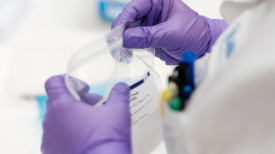- Cancer Care Team
Cancer Care Team
To deliver optimal patient outcomesProducts and Services
Cancer Type
Supplies & Tools
Scientific Focus
- Biopharma Partners
- Patients
- Education & Events
- Login
- Contact Us
Test Details
 Cancer Type
Cancer Type
Colorectal cancer (CRC), Endometrial, Lynch syndrome
 Technology Used
Technology Used
IHC, Molecular
 Turnaround Time
Turnaround Time
5-7 days
Use
Lynch syndrome (LS), an autosomal dominant familial cancer syndrome, is caused by inherited mutations in five genes (MLH1, MSH2, MSH6, PMS2, and EPCAM) that disrupt the mismatch repair (MMR) pathway. This disruption causes microsatellite instability (MSI) that may lead to oncogenesis. Lynch syndrome accounts for about 3% of all colorectal cancer (CRC) cases and is associated with increased risk of gastric, brain, upper urinary tract, and endometrial cancer in women.
Methodology
IHC, PCR
References
Giardiello, FM et al., Guidelines on genetic evaluation and management of Lynch syndrome: A consensus statement by the U.S. Multi-Society Task Force on Colorectal Cancer. Gastrointestinal Endoscopy 2014; 80:197-219. Kohlmann, W et al., Lynch syndrome. GeneReviews 2014: Available online. Accessed 1/14/2015. Kempers MJ et al., Risk of colorectal and endometrial cancers in EPCAM deletion-positive Lynch syndrome: a cohort study. Lancet Oncol 2011; 12:49-55. Hampel H et al., Feasibility of Screening for Lynch Syndrome Among Patients With Colorectal Cancer. J Clin Oncol 2008; 26:5783-8. The NCCN® Clinical Practice Guidelines in Oncology €“ Genetic/Familial High-Risk Assessment: Colorectal (Version 2.2014). ©National Comprehensive Cancer Network, Inc. 2015. NCCN® and NCCN Guidelines® are trademarks owned by the National Comprehensive Cancer Network, Inc.
Specimen Requirements
Information on collection, storage, and volume
Specimen
Formalin-fixed paraffin-embedded tissue block and either 7ml whole blood or paraffin-embedded normal tissue (for MSI control)
Volume
Tumor area ‰¥4 mm2 and ‰¥50% tumor preferred
Container
Paraffin block and lavendar top (EDTA) tube
Storage Instructions
Maintain specimen at room temperature.
Causes for Rejection
No evidence of tumor or normal tissue; hemolyzed blood; insufficient quantity for analysis
Related Tests
Find more tests related to this one.





